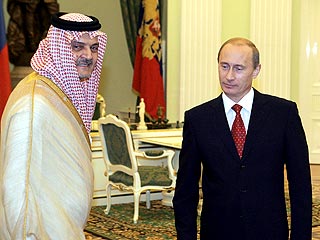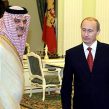
MOSCOW QUIETLY RAISES ITS GAME IN THE MIDDLE EAST
Publication: Eurasia Daily Monitor Volume: 3 Issue: 147
By:

Three weeks after the eruption of hostilities in Lebanon, Russia has remained uncharacteristically cautious and reserved. President Vladimir Putin took a very active stance in the debates on the conflict at the July 15-17 G-8 summit in St. Petersburg and claimed credit for “softening” the joint statement in such a way that Syria was not mentioned, which prompted a few acrimonious “off-the-record” comments by U.S. President George W. Bush and U.K. Prime Minister Tony Blair (Vremya novostei, July 18). A central point in Putin’s message was that the G-8 should not try to allocate blame or advance an initiative, because management of this conflict properly belongs with the UN Security Council. In the Security Council, however, Russia assumed a rather low profile giving ample chance for the United States to fall into the usual trap of having to veto a resolution condemning Israeli actions and then leaving it to France to outrun Washington in proposing a draft resolution on the plan for resolving the crisis (Lenta.ru, July 30).
The coverage of the ongoing combat operations in the Russian media has remained remarkably balanced, so that interviews with outspoken Israeli Ambassador to Russia Arkady Milman appear as often as rather graphic reporting from Beirut (Izvestiya, Moskovskie novosti, July 28). Demonstrations in Moscow were of such miniscule scale that only the Iranian press agency noticed them (IRNA, July 21). The official line has been formulated in particularly diplomatic words, and, when holding a meeting with Saud Al-Faisal, foreign minister of Saudi Arabia, Putin chose to emphasize, “The state of Israel has the right to and should live in security.” These words were interpreted in Israel, perhaps optimistically, as “a strong message of friendship” (Jerusalem Post, July 27). What was certainly more significant in this context was the publication by the FSB of Russia’s list of 17 terrorist organizations; the omission of Hamas and Hezbollah was explained by the lack of any threats to Russia’s security on their part (Rossiiskaya gazeta, July 28).
Such a position invites accusations of applying “double standards” and being egoistically selective in the global war against terrorism (see EDM, July 20). Moscow shrugs off such “insinuations” without even bothering to refer to selfish motives in the contributions of other partners in the U.S.-led anti-terrorist coalition. There is more to this self-confidence than just the gradually accumulated knowledge that politics is not only the art of possible, but also the science of applying the right standards to different conflicts. It is based on the newly arrived certainty that Russia’s own long and painful war with terror has been finally brought to a decisive victory with the death of Chechen warlord Shamil Basaev (Expert, July 17). There is still the unresolved business with the extradition of Akhmed Zakaev from the U.K., but it is more about tidying up the last loose ends of the irritating problem (Gazeta.ru, July 26).
Moscow’s self-confidence is also supported by the assessment of the conflict dynamics in the Middle East that suggest a very probable strengthening of its quietly advanced position in a matter of a few weeks. This position is by no means moral but entirely pragmatic: No international framework for Lebanon could be negotiated without involving Syria; no agreement with the government of Lebanon could be implemented if Hezbollah is not a part of it; no stable arrangement for Gaza could be hammered out against the resistance of Hamas. The Kremlin calculates that it would take a few weeks for Israel to recognize that the spectacular devastation of Southern Lebanon could not significantly weaken the military capabilities and political influence of Hezbollah, much the same way as the full-blown invasion in 1982 did not bring about the destruction of the PLO. Meanwhile, the outrage in the Arab states and the indignation in Europe about the scale of the unfolding humanitarian catastrophe would predictably reach such levels that a ceasefire becomes imperative whatever reservations Secretary of State Condoleezza Rice might state. That is why Moscow was not in the least upset by the failure of the Rome conference last week, where Syria was not represented, expecting that the forum would be reconvened when Washington is forced to swallow its objections against sitting at one table with a representative from Damascus
These assessments go significantly further than just reserving for itself a role of mediator who is on speaking terms with all parties to the conflict and can “sell” them the plan developed by “great powers.” Back in July 2000, Putin arrived at the G-8 summit in Okinawa full of enthusiasm after visiting Pyongyang and announced that he had secured a nuclear deal with North Korea, which in a few days fell apart as a “misunderstanding.” After the unquestionable triumph at this year’ G-8 summit, Putin does not want to be a messenger of any kind; the ambition now is for playing a major and independent role in the Middle East. As Dmitri Trenin pointed out, this claim is underpinned by the conclusion that the flawed U.S. intervention in Iraq has already failed and the inevitable retreat would deeply undermine Western influence across the region (Polit.ru, July 27). The present-day military overstretch reduces NATO’s ability to deploy a meaningful peacekeeping force in Lebanon, while Russia, facing only limited residual tasks in Chechnya, could usefully contribute a couple of battalions and not worry much about putting the troops in harm’s way.
It is quite clear that these ambitions are not limited to advancing narrowly defined “national interests”; for that matter, the value of arms that Russia sells to Syria is pitifully low compared with exports to China or even the new deals signed with Venezuela. Fundamentally, Russia’s interests in the Middle East are focused on keeping oil prices as high as possible, and the deepening disaster in Iraq is taking care of that. Putin now wants to experience the thrill of a big political game where he does not even need to play against the United States, but could take advantage of its every misstep.




